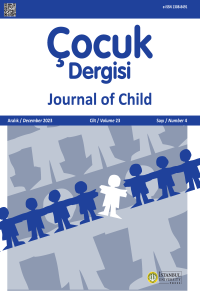Anti-Glomerular Basement Membrane Disease in a Pediatric Patient with SARS-CoV-2 Infection: A Case Report
Öz
Anti-glomerular basement membrane (anti-GBM) disease is a rare autoimmune condition that leads to rapidly progressive glomerulonephritis, particularly uncommon in children. An 8-year-old boy was admitted to the emergency department presenting with macroscopic hematuria and oliguria. Notably, he had been hospitalized 5 weeks earlier due to a COVID-19 infection, with subsequent negative COVID-PCR results upon discharge. The systemic physical examination revealed pretibial and periorbital edema, but it was otherwise unremarkable. Importantly, there was no hypocomplementemia, and all autoantibodies tested were negative, except for anti-GBM antibodies. Over the 2-day follow-up, serum creatinine levels exhibited a steady increase from 0.63 to 6.4 mg/dL. Renal biopsy result indicated crescentic glomerulonephritis associated with anti-GBM disease. The patient responded positively to treatment with methylprednisolone, cyclophosphamide, and plasmapheresis, followed by intravenous immunoglobulin. The patient showed remarkable improvement, with the last recorded serum creatinine level at 0.57 mg/dL. Our case report suggests a potential pathogenic association between COVID-19 infection and the development of anti-GBM disease, resulting in a rapidly progressive form of crescentic glomerulonephritis in children.
Anahtar Kelimeler
Kaynakça
- Hirayama K, Yamagata K. Anti-Glomerular Basement Membrane Disease. In: Sharma P, ed. An Update on Glomerulopathies-Clinical and Treatment Aspects. Intech Publishers; Shanghai, China 2011:251-76 google scholar
- Couser WG. Rapidly progressive glomerulonephritis: Classification, pathogenetic mechanisms, and therapy. Am J Kidney Dis 1988;11(6):449-64 google scholar
- Prendecki M, Clarke C, Cairns T, et al. Anti-glomerular basement membrane disease during the COVID-19 pandemic. Kidney Int 2020;98(3):780—1 google scholar
- Silvarino R, Noboa O, Cervera R. Anti-glomerular basement membrane antibodies. Isr Med Assoc J 2014;16(11):727-32 google scholar
- Hellmark T, Segelmark M. Diagnosis and classification of Goodpasture’s disease (anti-GBM). J Autoimmun 2014;48-49:108-12 google scholar
- McAdoo S, Pusey C. Clustering of anti-GBM disease: clues to an environmental trigger? Clin J Am Soc Nephrol 2016;11(8):1324-6 google scholar
- Segelmark M, Hellmark T. Autoimmune kidney diseases. Autoimmun Rev 2010;9(5):A366-71 google scholar
- Pei G, Zhang Z, Peng J, et al. Renal involvement and early prognosis in patients with COVID-19 Pneumonia. J Am Soc Nephrol 2020;31(6):1157—65 google scholar
- Sebastian R, Arunachalam J, Rajendran M. Temporal Clustering of Antiglomerular Basement Membrane Disease in COVID-19 Pandemic: A Case Series. Int J Nephrol Renovasc Dis 2021;14:393-8 google scholar
- Winkler A, Zitt E, Sprenger-Mahr H, Soleiman A, Cejna M, Lhotta K. SARS-CoV-2 infection and recurrence of anti-glomerular basement disease: a case report. BMC Nephrology 2021;22(1):75 google scholar
Öz
Kaynakça
- Hirayama K, Yamagata K. Anti-Glomerular Basement Membrane Disease. In: Sharma P, ed. An Update on Glomerulopathies-Clinical and Treatment Aspects. Intech Publishers; Shanghai, China 2011:251-76 google scholar
- Couser WG. Rapidly progressive glomerulonephritis: Classification, pathogenetic mechanisms, and therapy. Am J Kidney Dis 1988;11(6):449-64 google scholar
- Prendecki M, Clarke C, Cairns T, et al. Anti-glomerular basement membrane disease during the COVID-19 pandemic. Kidney Int 2020;98(3):780—1 google scholar
- Silvarino R, Noboa O, Cervera R. Anti-glomerular basement membrane antibodies. Isr Med Assoc J 2014;16(11):727-32 google scholar
- Hellmark T, Segelmark M. Diagnosis and classification of Goodpasture’s disease (anti-GBM). J Autoimmun 2014;48-49:108-12 google scholar
- McAdoo S, Pusey C. Clustering of anti-GBM disease: clues to an environmental trigger? Clin J Am Soc Nephrol 2016;11(8):1324-6 google scholar
- Segelmark M, Hellmark T. Autoimmune kidney diseases. Autoimmun Rev 2010;9(5):A366-71 google scholar
- Pei G, Zhang Z, Peng J, et al. Renal involvement and early prognosis in patients with COVID-19 Pneumonia. J Am Soc Nephrol 2020;31(6):1157—65 google scholar
- Sebastian R, Arunachalam J, Rajendran M. Temporal Clustering of Antiglomerular Basement Membrane Disease in COVID-19 Pandemic: A Case Series. Int J Nephrol Renovasc Dis 2021;14:393-8 google scholar
- Winkler A, Zitt E, Sprenger-Mahr H, Soleiman A, Cejna M, Lhotta K. SARS-CoV-2 infection and recurrence of anti-glomerular basement disease: a case report. BMC Nephrology 2021;22(1):75 google scholar
Ayrıntılar
| Birincil Dil | İngilizce |
|---|---|
| Konular | Çocuk Sağlığı ve Hastalıkları (Diğer) |
| Bölüm | Olgu Sunumu |
| Yazarlar | |
| Yayımlanma Tarihi | 20 Şubat 2024 |
| Yayımlandığı Sayı | Yıl 2024 Cilt: 23 Sayı: 4 |


